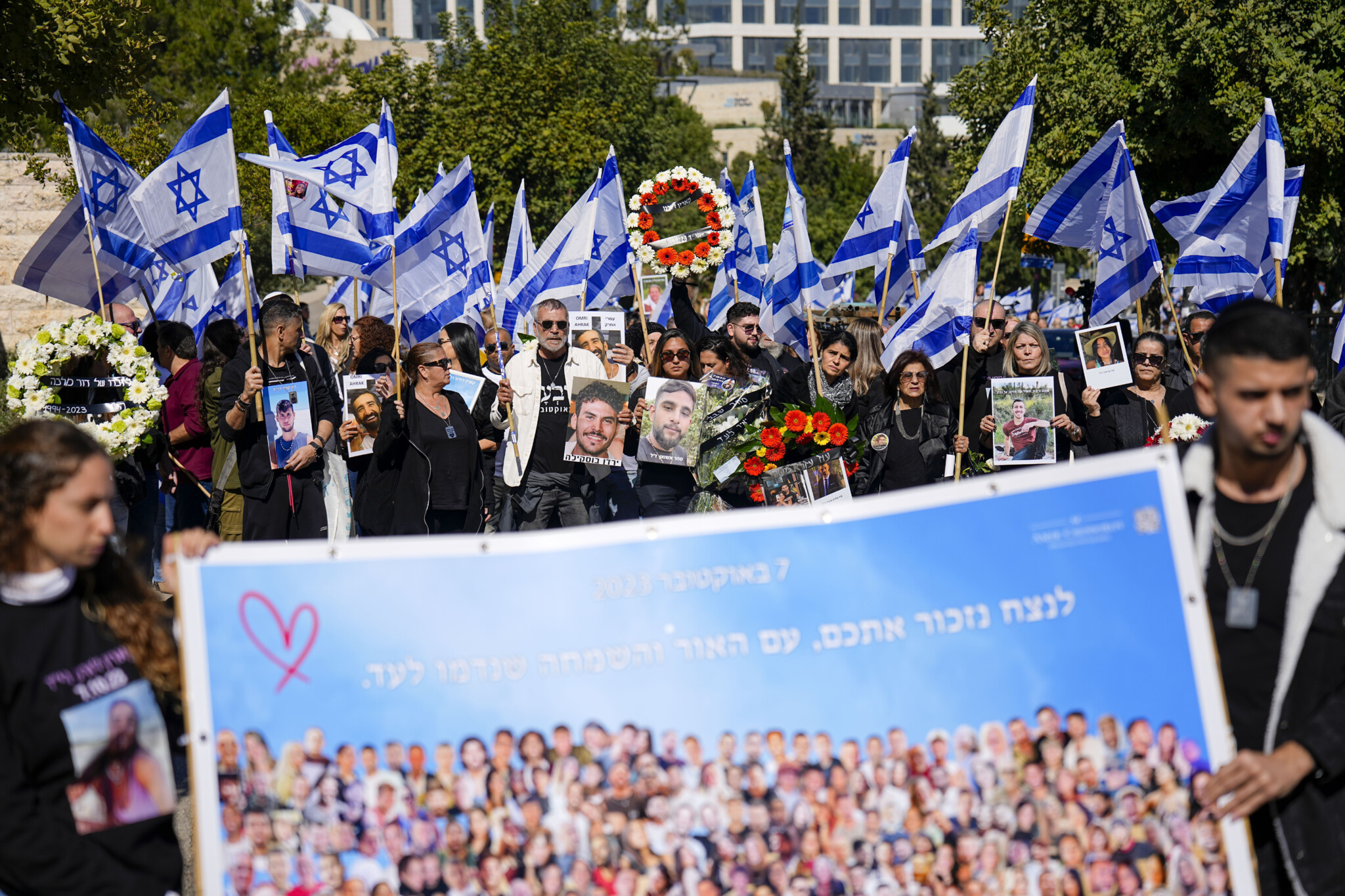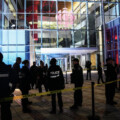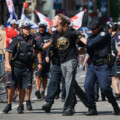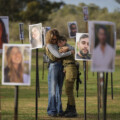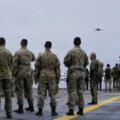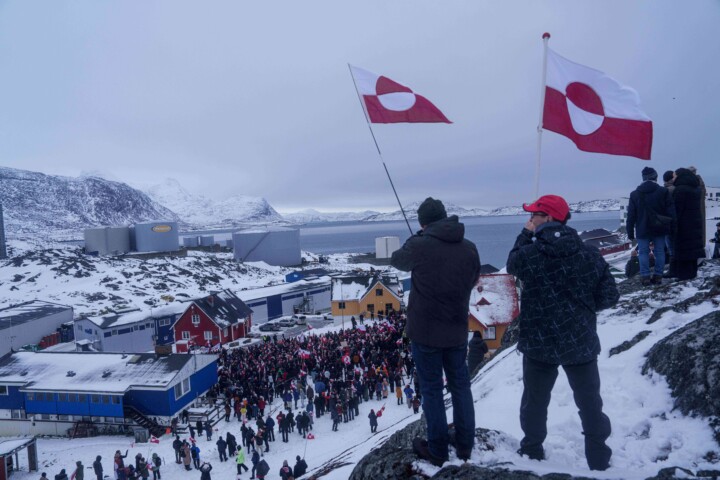Exactly one year ago today, Israel experienced the horror that was October 7th. That day saw the most Jews slaughtered in a single day since the Holocaust.
Since then, conflict has expanded across the region, including in Gaza and Lebanon. It also has deeply divided the populations of Western countries and contributed to a massive spike in antisemitism.
The Hub has collected personal reflections from a handful of our contributors to get a sense of how they are considering this moment.
Courage must be contagious
By Melissa Lantsman, co-deputy leader of the Conservative Party of Canada and Member of Parliament for Thornhill
Since October 7th, the eyes of the world have seen true courage.
The courage of young soldiers, fighting for the very existence of their state, and to protect Western democratic values from savage terror.
The courage of hostages still in the grips of sadistic barbarism and of their loved ones, keeping hope even when it seems all is lost.
The courage of Jews being proudly and visibly Jewish—itself an act of defiance due to rising and vile antisemitism.
The courage of their allies who stand tall with them.
The courage of brave Iranian dissidents in resolute opposition to the tyrants in Tehran.
The courage of these heroes stands in stark contrast to the cowardice of the Liberal government, radical public union bosses, woke-obsessed academics, and those who stand idly by.
A government that is so obviously playing both sides, even if it means abandoning our principles while putting Canadians at risk. They try to say everything and say nothing at the same time.
It’s why hate crimes are up 250 percent since 2015 and why chaos and disorder rule supreme in our streets with complete impunity.
If we are to emerge from this, we’ll need the courage of all those with moral clarity—those who are defenders of freedom, those who know that everything is not okay. We’ll need their courage to be contagious.
Light must replace the darkness
By Anthony Housefather, the Liberal Member of Parliament for Mount Royal and the Prime Minister’s special advisor on jewish community relations and antisemitism
October 7, 2023, was one of the worst days in Jewish history—and there have been a lot of bad days in our long history. It was the day Hamas attacked Israel, slaughtered over 1,200 people, and kidnapped hundreds of others.
Then a wave of antisemitism swept across the world. People here at home telling Jews to go back to Poland. Firing shots into our schools, yelling hateful slogans outside our community buildings, setting up encampments on university campuses, and attacking our support for Israel.
These events have left most Jews I know in Canada and across the globe feeling angry. Feeling that governments across the world, Right or Left, federal or provincial or municipal, were all derelict in taking the necessary actions to enforce the law and keep us safe. Feeling that the world abandoned Israel at a time when it was defending itself against Iran and its terrorist proxies.
But as the Jewish New Year arrives, I continue to believe that most people are good. That the darkness of the last year will be replaced by light. I am inspired by Alexandre Look, from my riding, who was murdered on October 7th at the Supernova music festival. He was one of seven Canadians killed that day. He died a hero trying to shield friends and complete strangers from the terrorists.
Like Alex, I believe most people are good. That as people see the pain their Jewish friends and neighbours are feeling, they will join the courageous allies who have been speaking out over the last year to condemn antisemitism.
This is in everyone’s interest. Because as we all know, it may start with the Jews but it never ends with the Jews.
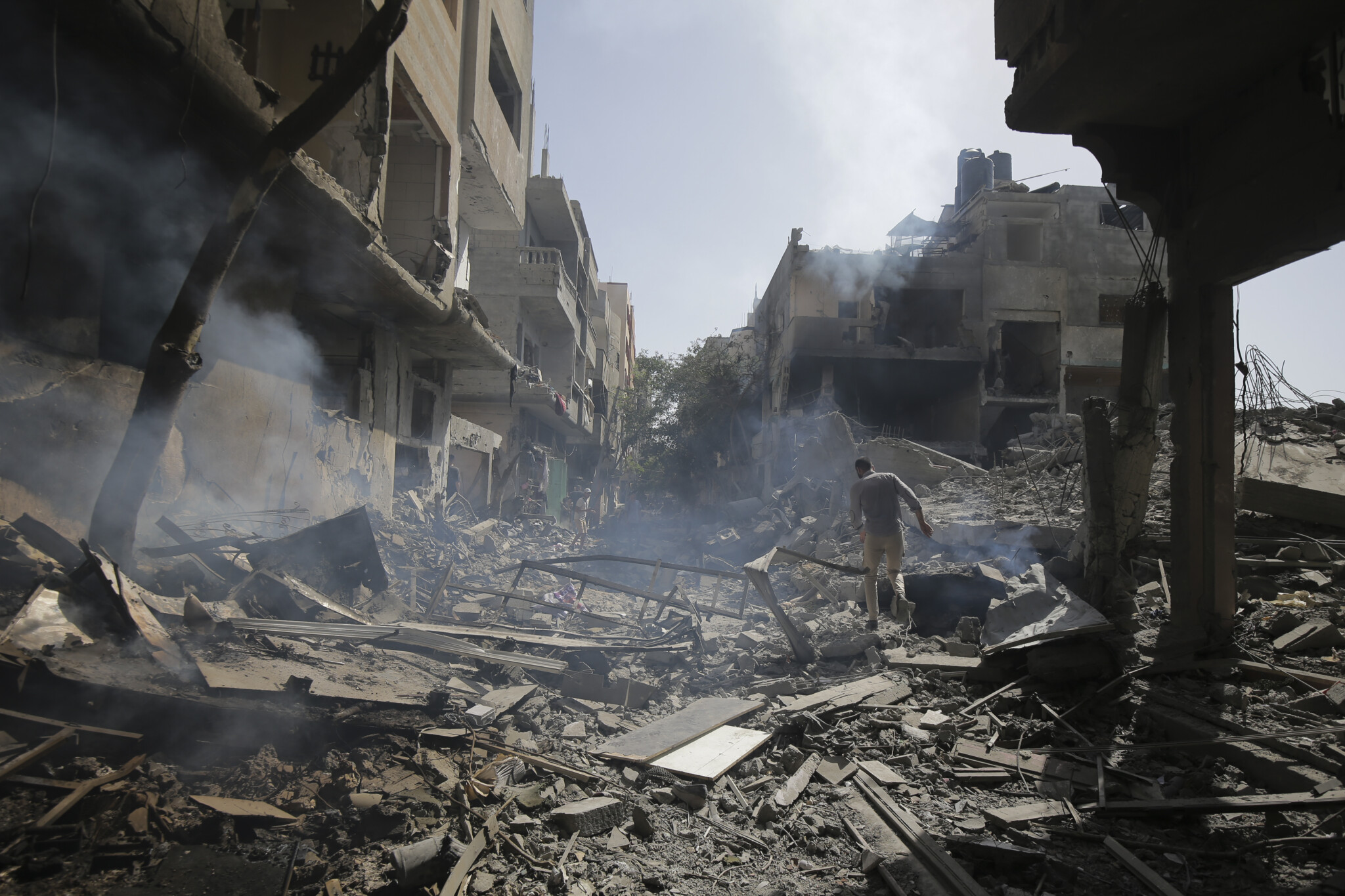
Palestinians look at the aftermath of the Israeli bombing in Nuseirat refugee camp, Gaza Strip, Saturday, June 8, 2024. (Jehad Alshrafi/AP Photo)
Everyone has lost
By Janice Stein, founding director of the Munk School of Global Affairs & Public Policy
One year later, all the parties to the war have lost.
Israel has lost. Hamas’ attack has scarred and radicalized Israel’s society, perhaps so deeply that the damage is irrevocable. Its military response to that attack has damaged Israel’s international reputation and forfeited the support of a generation of young people.
Israel’s military response has killed unprecedented numbers of Palestinians, displaced millions multiple times over, and destroyed the infrastructure of Gaza. It is difficult to imagine who will rebuild Gaza and how. Palestinians are living a nightmare, with no end and no help in sight.
Hamas has lost. Its leaders are dead or in hiding, its allies are largely on the sidelines, and Gazans are angry at leaders that do not care about their suffering.
Hizbollah has lost. Its long-time leader assassinated, its command-and-control disrupted. It is weaker than it has been in decades.
Iran has lost its most important forward defense and is far more vulnerable to an attack by Israel.
The United States has lost. It has failed to broker a ceasefire, its president and his team have been humiliated, and the Middle East is on the verge of spiralling toward a regional war.
Perhaps only China has won, as it stands back from the carnage and watches its American arch rival struggle.
It is so much easier to start wars than to stop them, even when everyone is losing.
Liberal democracy under siege
Vivian Bercovici, Canada’s former ambassador to Israel and founder of the online newsletter State of Tel Aviv
October 7th was a day of infamy; the moment that the western world exposed its absolute moral corrosion.
It is about the opportunistic pandering of western, liberal democracies to a fascistic Islamist culture. It is about empowering extreme ideologues who promote identity-based victimhood as the only legitimate arbiter of one’s rightful place in society.
Racialism determines everything. And, as with the Nazi movement, Islamists—as well as so-called “progressives”—see Jews and Zionists as being white (factually untrue) and therefore, oppressive, settler, colonial; racists with no redeeming qualities. Jews personify the ultimate evil among humanity.
Israel, so understood, is a nation that brought upon itself the barbaric massacre and torture of October 7th and its ongoing aftermath. Incinerating babies, alive, torturing, raping, all manner of violence visited upon civilians by Hamas on that day was, say the Islamists and so-called progressives, “legitimate resistance.”
But, this is about so much more than the Jews. It is about the putrefaction of our governing institutions and moral fiber.
Weak leadership—fearful of managing the extremists among us—has emboldened this growing threat. This is about a clash of civilizations, just as we saw in the 1930s. At the moment, we are led by a pack of Chamberlains, which does not bode well for the values so many of us cherish and, perhaps, take for granted: freedom, equality, decency.
Liberal democracies are under siege. That is what October 7th was and is really about.
Attacks, alliances, and betrayal
By Dan Dunsky, a veteran journalist and analyst
For those who pay attention to the Middle East, or have spent time covering it, it’s tempting to find labyrinthine manoeuvrings in all the attacks, alliances, and betrayals that bedevil the region. There is no doubt the area is complicated with numerous national, sub-national, sectarian, and historical factors, all contributing to various narratives promising to explain what’s really going on, or what started it all.
Sometimes, though, even there, A simply leads to B. It is indisputably the case that, over several decades, the Iranian regime has armed several existing resistance/militant/terrorist groups (pick your term) to pressure the “little Satan” because of Iran’s resistance to Western influence in general, and its fierce opposition to Israel in particular. Though, by all accounts, Iran didn’t order Hamas’ unprecedented attack on Israel—which were joined the next day by its strongest regional proxy, Hezbollah—we are seeing the predictable results of Tehran’s tactics.
Another simple point: whatever your views about the Israel-Palestinian conflict, forget about who is right and who is wrong for a moment. These two indigenous groups—with thick layers of history, religion, and ideology piled on—will continue to fight until one of two conditions prevails: one side thoroughly destroys the other (unlikely, whether by lack of will or ability), or both sides exhaust themselves to the point they realize they have more to gain by negotiating than by killing. Until then, more blood will be spilled, especially that of civilians.
Iran, pulling the strings
By Kaveh Shahrooz, a lawyer and human rights activist
As an activist who works on the cause of democracy in Iran, I have for years framed my argument to Western policymakers in the following way: “You may think that Iran’s regime is only a problem for Iran’s people, but they are not. They are a problem for you.”
The absolute barbarism on display on October 7th was a vindication of that thesis.
For years the West has tried to contain Iran’s regime. The nuclear deal, for which much was sacrificed, was entirely about containment.
But October 7th proved that Iran’s regime cannot be meaningfully contained. Antisemitism isn’t just a policy position the regime has adopted that they can rein in as part of a political bargain. The desire to destroy Israel and the Jewish people is part of their DNA. They can no more abandon it than a fish can abandon swimming.
October 7th and the subsequent actions by the Lebanese Hezbollah proved that Iran, and not its proxies, is really the core problem. The threats, primarily to Israel but also to other Western countries, will continue so long as the Iranian regime is in power.
Mercifully, the events of the past year, and in particular the absolute humiliation of Hezbollah in the past few weeks, have also shown something else: Iran’s regime is much weaker than it claims.
It can be overthrown.
October 7th showed that it must be.

A woman holds a placard during a ‘Stand With Israel’ rally to mark 100 days since the October 7th attack in London, Sunday, Jan. 14, 2024. Protesters gather in London to show solidarity with the people of Israel and to demand the release of the more than 100 people kidnapped by Hamas on October 7 who remain hostage. Frank Augstein/AP Photo
Spare a moment for the hostages
By Ariella Kimmel, vice-president of strategic communications and development for Winston Wilmont
An emotional plea.
Over the last year I have written in this publication about the October 7th massacre and the aftermath for the Jewish community here in Canada and around the world. Who would have thought that in the wake of the Hamas terrorist attack on Israel, Jews here in Canada would experience a rise in antisemitism with our neighbourhoods, schools, daycares, synagogues, and community centres being targeted?
But amongst all of this—what has felt like a daily battle against hate—I have watched as the hostages taken by Hamas on that horrific day have almost disappeared from conversations and in Canadian media. Today, as I write this, 101 hostages are still being held by a terrorist organization. This should not be a Jewish issue alone; it is a humanitarian one. But the calls for their return have become an afterthought, a permanent part of politicians’ statements on the Middle East, but with no real concrete action. The silence feels almost as suffocating as the dark tunnels in which we know many are being held.
For over a year, 101 families have begged and pleaded to be heard—for the international community to scream alongside them. Just a month ago, six of the hostages were executed as the Israeli army came closer to where they were being held. Their bodies told the story of torture, starvation, and beatings. The body of one, Eden Yerushalmi, returned for burial weighing a mere 79 pounds.
I head into this anniversary feeling heartbroken and often hopeless. So, while I have many requests for my fellow Canadians, today on the one-year anniversary it is this: take the time to share one name, one story, so that they are kept alive in our minds.
In an interview my friend Maureen Leshem, the cousin of 24-year-old hostage Romi Gonen, gave just a few weeks ago, she implored people to start speaking up. In her words, “If you haven’t spoken up yet, now is the time.”
There is no going back
By David Mandel, a Toronto-based cognitive psychologist
Some days make history. Others change the course of history. 10/7 tragically made history. It recorded Hamas’s crimes against humanity. We are still waiting to learn whether 10/7 will change the course of history. The instigation of collective violence against Israeli citizens first by Hamas and the next day by Hezbollah has led to so much destruction and misery. I remember the outpouring of support for Americans after 9/11. But on 10/8, the Jewish diaspora, including in Canada, had a rude awakening. Antisemitism skyrocketed. Israel, the victim, was demonized, while the perpetrators were glorified as “resistance fighters.” In the year since 10/7, institutions of higher education became encampments of hate; our cities were terrorized.
The hatred was not only directed at Jews, who were told to go back to Poland or that Hitler should have finished the job, or at Israel, which was falsely portrayed as an apartheid and genocidal state as it fought for its survival, but of the West, in general.
The genie is out of the bottle. There is no going back to the state of 10/6. The question is what kind of world will we make of it? Who will now stand and fight for what is right?
Closer than you think
By Howard Fremeth, a communications and public affairs professional based in Ottawa
There has been a lot to lament over the past year, but I’m content about one thing—knowing my bubbie (grandmother) passed away well before the massacre.
I’m part of a generation that grew up thinking the Holocaust was a compilation of stories our grandparents told us about a distant past, in a foreign country. We’re the children of parents who got caught up in (Pierre) Trudeaumania and who reaped the rewards of post-Second World War prosperity.
Our generation came of age during the optimism of the Oslo Accords. We learned the names of all the Canadian Jews who rose to prominence—Abella, Gray, Rogen, Drake…
That’s not to say things were always rosy in our time; there were Iraqi Scuds falling on Tel Aviv, the Second Intifada, and Israeli apartheid weeks on campus. Yet the arrow of history seemed to be pointing in the right direction. All of that changed on October 7th. And now, I’m the parent.
I’ve explained to my kids why swastikas are paraded on Parliament Hill, why police are stationed outside their school, why Jews are taken hostage, and why Iranian missiles target the Holy Land. What scares me the most is the thought that there’s only one generation separating me from my bubbie.
Was my life the exception of Jewish history? Are my children condemned to experience the norm?
Deep pain, deep divisions
By Joanna Baron, a litigator and the executive director of the Canadian Constitution Foundation
What has gobsmacked me in the year since October 7th is the exhausting all-encompassing nature of it all. The bifurcation of the world into pro-Israel versus pro-Palestine camps has been inescapable.
A women’s personal finance influencer I followed on social media now exclusively posts venomous content in solidarity with the Palestinian cause, including lists of Jewish-owned restaurants in Canadian cities to boycott and details about the history of the “nefarious Jewish domination” of Hollywood. My friend in Montreal keeps an album with screenshots of women’s Bumble dating profiles warning “Zios” against swiping right. Friends from the Toronto yoga studio I teach at share ironic memes, cackling about the Nova Music Festival massacre being just desserts for raving on “stolen land.”
Both sides are utterly aghast by the other. The schism truly seems insurmountable. How can I look someone in the eyes again who thinks October 7th’s atrocities can be justified by “context”?
I lost a friend in February over an exchange about pro-Palestinian protestors targeting the historically Jewish Mount Sinai Hospital in Toronto. They disputed that there was anything inappropriate about the protest. My last message to them read:
I’m still unclear on your position. Is it that targeting a Jewish hospital is not antisemitic?
Or, do you agree that it is antisemitic, but that casually targeting Jewish institutions on the streets of Toronto is somehow justified by the horrors in Gaza?
They never replied.
Douglas Murray put it best in the days following October 7th: “Sometimes a flare goes up, and you see exactly where everyone is.”
I can never unsee it.
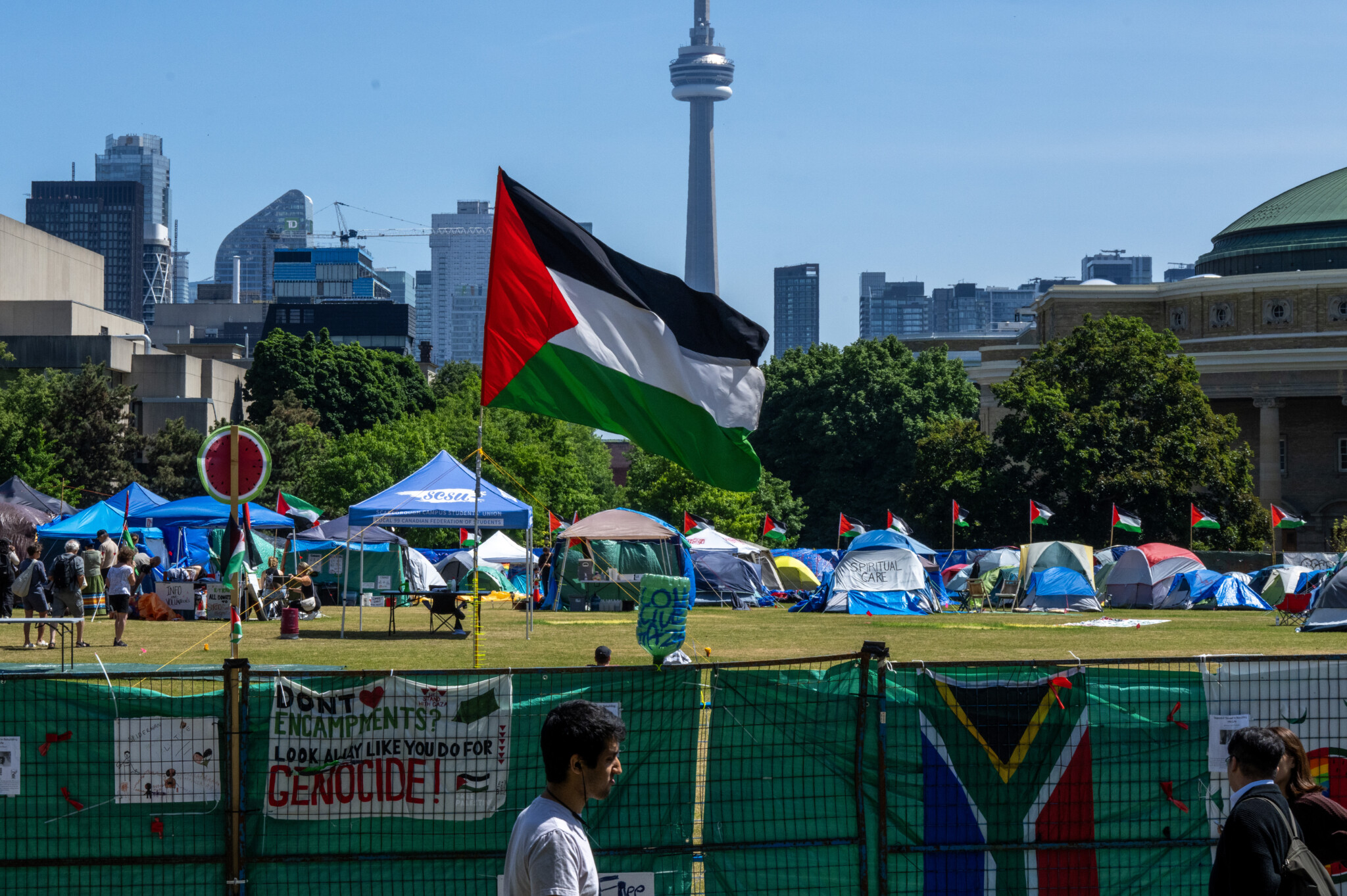
A Palestinian flag flies over the pro-Palestinian encampment set up at the University of Toronto campus, in Toronto, Sunday, May 26, 2024. Frank Gunn/The Canadian Press
Poisoned campus culture
By Aiden Muscovitch, a University of Toronto student and The Hub’s outer space correspondent
Despite how far away the atrocities that took place a year ago in Israel were, the ripples of Hamas’ brutal terrorism were felt in Canada, especially at our universities.
On that day and in the months after, the world witnessed violence of the most unconscionable nature. Yet, somehow, students and faculty at Canadian universities saw the slaughter, rape, and kidnapping of innocent Jews as “justified,” since they committed the absurd offence of being Jews residing in their ancestral homeland.
Just in the last few weeks, the president of the University of Toronto, Meric Gertler, admitted to the “deeply troubling upsurge in antisemitic acts and speech” that occurred “at institutions of higher education, including the University of Toronto.” Yet, what has been done? Where have the Canadian values gone at the university under his watch? Why did he wait a year to clearly and definitively reject the hatred brewing at U of T?
I saw the usually beautiful and peaceful King’s College Circle at the heart of U of T’s campus filled with hateful chants demanding to globalize terrorism. The barriers went up and an encampment was built, all under the nose of the administration. At least 45 professors visited the encampment.
The months that followed October 7 highlighted that the academy in Canada has seemingly lost sight of its primary function, which is to teach and facilitate the learning of the next generation of Canadians. Instead, the academy has fallen into the hands of the mob.
October 7th was horrific and deeply painful. The months that followed it were scary and long, yet clarifying. The future of Canada relies on the maintenance of Canadian values in our education, including the outright rejection of terrorism. Hopefully, this year, Canadian university administrators will take active steps toward restoring these Canadian values in the academy. Better a year too late than never.
Code red
By Michael Geist, Canada research chair in internet and e-commerce law at the University of Ottawa
Late on Friday, October 6, 2023, I was dozing after a family Sabbath dinner meal when I was suddenly awoken by the continuous buzzing of the Tzofar red alert app on my phone and watch. I had installed the app, which is widely used in Israel to warn of imminent rocket fire, months earlier while visiting on a teaching assignment, and had forgotten it was still on my phone. At first, I thought the app was malfunctioning since the buzzing would not stop and it implausibly appeared that hundreds of communities were under attack. Hours later I learned there was nothing wrong with the app and that I had digitally witnessed the start of the October 7th massacre in real time.
A year later I have deleted the app, but it feels as if the Canadian Jewish community needs something similar to warn of antisemitic outbreaks. Such an app would buzz nearly daily given the rise of antisemitism which emanates with astonishing frequency from both the extreme Right and Left.
What would have once sparked immediate condemnation now occurs with little commentary or surprise: synagogue vandalism incidents too numerous to mention, Jewish schools and community centres hit with gunfire or makeshift bombs, Jewish senior homes and hospitals facing hostile protests, and university campuses home to what multiple presidents admit is significant antisemitism problem.
Early efforts to mask the antisemitism have given way to the increasingly frequent exclusion of Jews from panels and other events, promotion of age-old tropes about divided loyalties, and open discussions on whether Canadian Jews can in fact be held responsible for the actions of the Israeli government. As a result, some feel the need to conceal their identity, speak in hushed tones when talking about antisemitism in public, or simply remain silent for fear of ostracization at work or school.
For many in the Jewish community, the pain and trauma of October 7th remains as fresh today as it was when we witnessed the largest massacre of Jews since the Holocaust. A year later, hostages remain in captivity, war has taken a terrible toll on the entire region, and my imagined antisemitism app will not stop buzzing.
The blinders are off
By Wodek Szemberg, Toronto writer and documentary filmmaker
The toughest lesson taught to progressive Jews on October 7th was that even “good Jews” will end up on the proverbial train to Auschwitz.
It was a particular tragedy for the pro-peace, pro-equality, pro – two state solution kibbutzniks who died horrible deaths committed by Palestinians from the neighbouring Gaza—some who knew them and their way around, as they used to work at those kibbutzim. It was a bloody reminder that those who really, really hate Jews, don’t discriminate between better and worse Jews.
No amount of guilt-ridden, “as a Jew” denunciations of Israeli ways of self-defence, no amount of keffiyeh-wearing young Jews on campuses denouncing Jewish particularism in the name of Jewish universalism, no amount of hating Netanyahu will absolve a Jew of their Jewiness in the eyes of a real antisemite. Every single one of them will fall through the sieve of anti-Semitic sorting.
Think of Vivian Silver (may her memory be for a blessing): the 74-year old, Winnipeg-born, resident of the kibbutz Be’eri, initially presumed captured by Hamas. She was a socialist, a feminist, a life-long activist dedicated to the possibility that an outstretched hand will be met with one in return. A co-founder of Arab-Jewish Center for Equality, Empowerment and Cooperation. Alas, there were no brownie points for that at the anti-colonialist freak-off on the satanic October 7th.
It took five weeks for her remains to be identified. Just imagine what kind of violence must be inflicted on a human body for it to end up so mutilated.
But will the right lessons be learned by Jews who are in the habit of turning their privileged cheeks, while rejecting altogether the morality of exacting a pound of flesh, when necessary?
On the margins, maybe. But for the most part people hate to have been wrong about their big commitments, especially if it makes them feel superior.
What all Jews must learn form October 7th and the world’s response to it, is that antisemitism is here to stay.
“There are always people around whom anti-Semitism is a light sleeper”, wrote Conor Cruise O’Brien. But, there are many more of them than we thought. The waning memory of the Holocaust will no longer protect Jews from the harping among non-Jews about the strangeness of Jewish singularity. The argument that Jews bleed like everyone else has not worked its magic in the past and it’s unlikely it will protect Jews in the future.
Given that antisemitism is here to stay, it will be incumbent on Jews to learn how to distinguish between antisemitism one can live with and the murderous kind. Not every kind of dislike of Jews leads to Holocaust envy. But understanding the distinction is essential for Jews who now have no reason to continue believing in the promise of “Never Again”.
Settler appropriation
By Karen Restoule, a vice president at Crestview Strategy and an Ojibwe from Dokis First Nation
Over the past year, we’ve seen an alarming rise in the use of words like “colonizer,” “settler,” and “decolonize” here in Canada to justify the atrocities committed by Hamas and other terrorist groups funded by Iran’s Islamic regime on October 7th and beyond.
Shockingly, anti-Israel/pro-Palestinian activists were quick to use this “oppressor vs. oppressed” narrative to defend expressions of violence and terror. They have have built a following by tapping into popular narratives of social justice warriors and Indigenous rights activists that resonate with many across university campuses and other progressive circles.
Every single week for the past year, these activists have taken to the streets in cities across Canada to openly glorify acts of terror against Israel and Jews in the diaspora.
They have disrupted university campuses by setting up encampments to symbolize what they perceive to be Palestinian justified “resistance” to Israeli oppressors. Their most recent ploy was seen on September 18th, when activists hijacked the Grassy Narrows First Nation River Run Rally and co-opted Toronto public school students ages 12 to 14 into their ideologically driven demonstration, chanting, “Turtle Island to Lebanon, Israel will be gone.”
I’ve been very clear on my position: as a First Nations woman, I fundamentally reject this politically motivated attempt by these activists to co-opt our relationship with the Crown and appropriate Indigenous identity to justify these horrors.
This January, I joined a witness mission to Israel with six other Canadians to meet with survivors of the October 7th attacks. We spoke with families who had lost loved ones, the families of hostages, and those who lived through the terror.
The most uncomfortable questions we were regularly asked was: “What is wrong with Canada?” “Why don’t Canadians see that Israel is under attack by terrorists?” Their confusion and hurt was palpable.
I was embarrassed as a Canadian.
Extremism must never be tolerated or justified in any form, at home or abroad.
